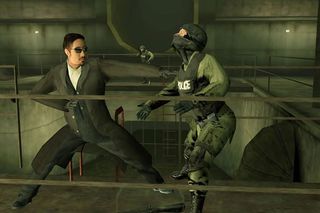1. Enter the Matrix
2003 | PS2, Xbox, GameCube, PC
Copies sold in US: More than 2.3 million
Average score: 62%
Enter the Matrix is possibly the worst game ever to sell as well as it did, and it was made all the more awful by its refusal to give fans what they really wanted: a chance to be Neo and kick insane levels of Agent Smith ass. Instead, Enter the Matrix starred Ghost and Niobe - two relatively minor characters from The Matrix: Reloaded - and shoved players into a punishing slog through a series of unfinished, buggy and astoundingly dull martial-arts fights, gunbattles and driving sequences.
The company line: "Enter the Matrix features awesome gunplay and spectacular martial arts that bend the rules of the Matrix, insane driving and stunts, and the chance to pilot the fastest hovercraft in the fleet."
What the critics said: Although it's almost universally reviled by critics today, more than a few gave Enter the Matrix high marks when it lazily rolled out of development and slumped, drooling, onto the market in 2003. Industry stalwart Game Informer gave gamers its "personal guarantee that you won't be able to put it down until you've seen all the new footage," while GamesRadar's own UK cousins at PSM2 had the balls-out audacity to call it "a tasty, violent adventure."
But cooler heads weighed in as well, with Electronic Gaming Monthly saying, "this game is a complete mess, and that's the only complete thing about it." But it was Eurogamer's criticism that put the finest point on it, with this scathing bit of ferocity: "It is blighted on so many levels by the blundering stupidity of its malformed stillborn design that recommending it is beyond us."

Why you bought it anyway: There are times when you want so badly for a game to be good, that you're so confident it'll be good, that you discount everything its critics say. They're not really fans, right? They don't get it like you get it. It's OK; we've all been there. And in this case, a lot of you put down money before reviews were even available - about four million of you worldwide, according to the game's pre-order sales figures.
It doesn't take a genius to figure out why: when Enter the Matrix shipped, seemingly every sci-fi geek on Earth - still high off the fumes from the first movie's thunderous 1999 debut - had been craving a Matrix game for four long years. The second said game became available, it was like opening enormous, desperate floodgates. It didn't matter if you didn't get to play as Neo, or if everything it did had been done already by other, better games - it was based on The Matrix, and everyone wanted to play in that universe. Even if it sucked, apparently.
What went wrong? Not being able to play as principal characters like Neo and Trinity was the first disappointment of Enter the Matrix, but its real problems were all deadline-related. Developer Shiny had already shown it had the chops to do kickass action games, and it had an unprecedented deal with the filmmakers, with movie footage shot especially for the game. Even so, Shiny had to struggle to meet fans' expectations while still getting the game out the door in time to hit alongside The Matrix: Reloaded. Sadly, the company couldn't pull it together in time, and Enter the Matrix was shoved out as an unfinished, buggy mess of awful controls and boring, needlessly repetitive action.
Most infuriatingly positive quote: Now-defunct GamersWave.com takes the prize with this gem: "This is one of those games where you can just sit and relax and get the most out of the title, free your mind, to coin a phrase!" You didn't coin the phrase, and also you're an idiot and you smell bad and your website no longer exists.

